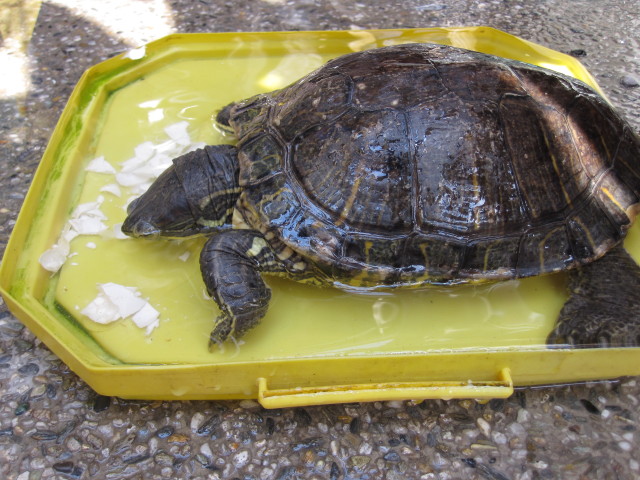QuestionQUESTION: Jeannie,
I'll do my best to follow the instructions you have posted. I have a few Eastern box turtles two females and two males. They vary in size from four to six inches in length and I am not sure about their age. Before they went into hibernation this last fall, I noticed one of the females (four inches in length) had one eye shut and it appeared to have some puss coming from it. I was not sure what it was and resolved to take her to the vet if the problem persisted after hibernation. The problem with her eyes not only persisted but now it seems to have spread to my other female (six inches in length) and to one of the males (six inches in length).
They exist in an enclosed fence line as their habitat and that includes a forested area (about 1/4 of an acre) and a grass area with sunlight (about 1/4 of an acre). The male emerged from hibernation looking fine with his red eyes apparent. Now his eyes are shut along with the two other females. The two females who have this eye problem also seem to have discharge from one of their nostrils.
I have been reading online about respiratory issues as well as Vit. A issues, and I am not sure what to think. After reading this page with some of the previous posts I am questioning if I should bring these turtles into the vet.
What do you propose?
Thank you for your time and expertise.
ANSWER: Hi Ryan,
Really hardly anyone ever follows my instructions, but it does help to have as much information as possible. Yes, I think you'd better take your turtles to the vet. Because they live outside, it's very unlikely that it's related to diet. You didn't say whether you hibernate them in one area together or if they dig in naturally, but I think it's quite possible that the infection in one turtle has spread to the others, and they will all need a course of antibiotics. Are you seeing any other symptoms such as runny nose, lethargy, lack of appetite, yawning, or wheezing?
If you need help locating a vet, please let me know. It's very important that whatever vet you go to, that you not allow vitamin injections, especially vitamin A. Since correct dosing of vitamins really isn't known, it's far too easy to overdose them with serious consequences, up to and including death. See http://www.turtlerescues.com/vitamin_a.htm. If the vet feels they are nutritionally deficient (and as I said, if they can eat naturally outdoors it's really not likely, especially if you live within their native range), you can easily correct the problem by providing additional food (fruits and vegetables) for them.
Keep me posted and let me know how they're doing, and if you need help finding a vet, just post back.
---------- FOLLOW-UP ----------
QUESTION: Jeannie,
Thank you for your quick response. I do need help finding a qualified vet in my area. I am located in Apex but am very close to Cary in North Carolina (outside Raleigh). Either city would work.
To answer your question: I do see some slight discharge coming from both female turtles nostrils (only one nostril from each turtle). It is not much but seems to be there. They don't move much and therefore, they are not eating much. I have tried to leave them alone in the large area, but I am not sure how much good that is doing. Because I largely leave them alone, they chose to hibernate where they wanted; however, I do suspect they have passed it around as the male who now has the eye issue gets around quite a bit;).
They do live very close to their native habitat, but with all I am reading I do suspect their diet. I just don't know how many plant nutrients we have growing in the forested area of our backyard. What do you recommend I supplement with the natural diet to which they are accustomed? What do they eat when they are in the wild? There do not seem to be too many carrots, squash and spinach growing in our area if you know what I mean.
Lastly, (sorry for the 20 questions bit), how can I avoid this respiratory issue in the future? Should I just let them go after they are treated and healthy again?
Please let me know your thoughts and thank you again for your expertise.
Ryan
AnswerHi Ryan,
OK, here's a few contacts for you. Unfortunately I was not able to find any vets in either Apex or Cary, but here's a link to search for vets in Raleigh. http://www.arav.org/ECOMARAV/timssnet/amm/tnt_mdsearch.cfm. Just enter "Raleigh" in the city area and select your state, then click on "Search." If you're not that close to Raleigh, you could try calling and see if they can give you a name closer to you. Another possibility is to contact the North Carolina Herpetological Society and ask for a vet referral. http://www.ncherps.org/contact_us.shtml.
Since the area you have your turtles in is fairly large and you're within their native range, if the area is planted naturally for the region they should have adequate vegetation. You can supplement with fruit such as strawberries, cantelope, blueberries, etc. (or plant berry bushes and strawberries). Here a link to a list that may help you: http://aboxturtle.com/box_turtle_diet.htm. It may help to add leaf or straw piles, pieces of bark, etc. to encourage more insects, slugs, and worms to the pen.
The best way to make sure this health issue doesn't happen again is to keep them in good shape. Plenty of space to roam is key, as well as a good diet, and you seem to be supplying that for the most part. It may just be that you had bad luck, since usually stress from too small quarters or poor diet is what causes them to get sick. I think you're doing pretty well.
I would speak to the herp society about releasing them after treatment. In your situation, it may be a bit of a gray area if they're native turtles that were taken out of the wild but kept outside in natural conditions. Generally speaking, once a turtle has spent time in captivity they shouldn't be released back to the wild because they can spread pathogens to the wild population, and often there are laws against it. The other problem is that boxies seem to have very specific territories, so if they're not returned to their original territory they may die anyway. I don't know how this would affect a long-term captive, though. Someone at the herp society should be able to discuss your specific situation and advise you on what to do.
If you have more questions, please ask!

 Softshell turtle nest
Question
Softshell nesting
Hi,
Just an hour ago, I have
Softshell turtle nest
Question
Softshell nesting
Hi,
Just an hour ago, I have
 Eggs?
QuestionQUESTION: I have an 11 ft snapping turtle. I wa
Eggs?
QuestionQUESTION: I have an 11 ft snapping turtle. I wa
 Pinkish worms in my red eared sliders stool
Question
My red eared slider
So just two days ago i saw
Pinkish worms in my red eared sliders stool
Question
My red eared slider
So just two days ago i saw
 obesity
Questionobesity
QUESTION: heres another picture
obesity
Questionobesity
QUESTION: heres another picture
 Wild Turtle
Question
Turtle I found at the
I have a small t
Wild Turtle
Question
Turtle I found at the
I have a small t